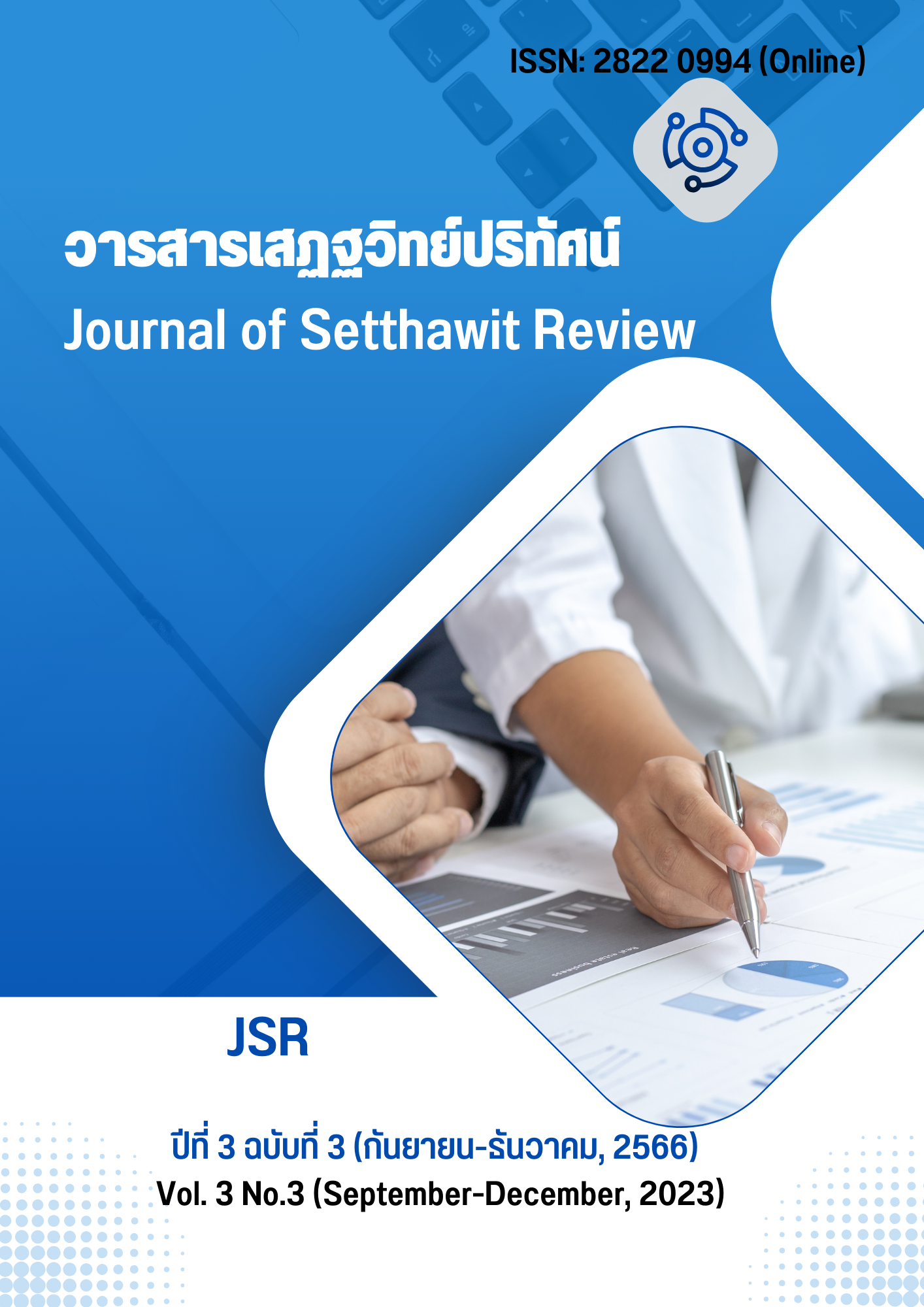Exploring Acculturation Strategies and Intercultural Communication Competence of Chinese International Students at a Private University in Thailand
Main Article Content
บทคัดย่อ
This study aimed to explore freshman Chinese international students’ acculturation strategies (AS) and intercultural communication competence (ICC) using explanatory sequential mixed method. A total of 145 Chinese undergraduates studying in six international programs at a private university self-assessed their AS and ICC through an online questionnaire; six of them voluntarily participated in semi-structured interviews. Data collected from the questionnaire were analyzed by SPSSPRO, frequency and percentage for the participants' personal information, and mean and standard deviation for their AS and ICC. Content analysis was used to analyze data from the interviews.
The quantitative results revealed their predominant choice of integration strategy ( =3.53) so as to maintain their own culture and seek involvement in Thai society and their highest level of ICC ( =4.29). Their highly self-perceived ICC driven by learning about English-speaking cultures previously during their study of English in middle and high schools (93.10%) and liking to learn about those English-speaking cultures (71.72%), acquiring intermediate and advanced English levels (84.82%), staying in the host country at least a year (77.94%), watching English movies (76.55%), reading cultural books (71.71%), and acquiring intermediate and advanced Thai levels (69.66%) were seen to influence their appropriate choice of AS. The qualitative outcomes supplemented reasons behind this choice in that they obviously recognized the integrative benefits which would make their life easier during their study in Thailand, help them communicate with people from different cultural backgrounds better and improve their academic performance. The findings implied that the Chinese students could undergo the process of acculturation better or adjust themselves to the Thai social environment more easily because they had positive attitudes towards other cultures, an understanding of their own culture and of others, skills in interacting with foreigners and dealing with cultural differences, and awareness of cultural values of Chinese culture and of others.
Article Details
เอกสารอ้างอิง
Berry, J.W. (1997). Immigration, Acculturation and Adaptation. Applied Psychology, 46,5-68.
Berry, J. W. (2005). Acculturation: Living Successfully in Two Cultures. International Journal of Intercultural Relations, 29, 697-712.
Berry, J. W. et al. (2006). Immigrant Youth: Acculturation, Identity, and Adaptation. Applied Psychology: An International Review, 55, 303-332.
Brislin, R. W. (1992). Cross-cultural Encounters: Face-to-face Interaction. Allyn & Bacon, Boston.
Byram, M. (1997). Teaching and Assessing Intercultural Communication Competence. New York: Cambridge
University Press.
Cao, C. et al. (2017). Predicting Chinese International Students’ Acculturation Strategies from Socio‐demographic
Variables and Social Ties. Asian Journal of Social Psychology, 20(2), 85-96.
Cheng, Y. (2018). A Study on Improving Intercultural Communication Competence of Chinese Students in Thailand.
National Institute of Development of Administration.
China and Globalization Think Tank (CCG). (2022). Blue Book of China Study Abroad Development Report. Study
Abroad, 22 (20), 68-73.
Chinese Ministry of Education. (2013). The Full-time Middle School English Syllabus. Beijing : Beijing Normal University Press.
Ching, Y. et al. (2017). Challenges Facing Chinese International Students Studying in the United States. Educational Research and Reviews, 12(8), 473-482.
Ding, D. (2021). A Study on Self-cognition of Chinese International Students' Intercultural Communicative Competence. Harbin Institute of Technology.
Guest, G. et al. (2006). How many interviews are enough? An experiment with data saturation and variability. Field methods, 18(1), 59-82.
Huang, S. Y. (2021). The Intercultural Adaptations of Chinese Students in a Thai International University. Interdisciplinary Research Review, 16(5), 8-13.
Karchru, B. (1985). Standards, Codification and Sociolinguistic Realism: English Language in the Outer Circle English in the World: Teaching and Learning the Language and Literatures. Beijing: Foreign Language Education and Research Press.
Lian, Y. & Tsang, K. K. (2014). The Impacts of Acculturation Strategies and Social Support on the Cross-cultural Adaptation of Mainland Chinese Students in Hong Kong. Educational Research Journal, 25(1), 81-102.
Liu, C. X. et al. (2014). Studies on Cross-cultural Adaptation of TCFL Majors Chinese Students from Honghe University While They Were Studying in Thailand. Journal of Read and Write, 11(4):17-23.
Liu, H. & Hu, J. (2013). Literature Review on the Concept and Theoretical Model of Cross-cultural Communication Ability. Academic Theory, (08), 169-171.
Lodico, M. G. et al. (2010). Methods in Educational Research: From Theory to Practice. John Wiley & Sons.
Ma, D. D. (2016). A Survey and Countermeasures on Cross-cultural Adaptation of Chinese Students Studying in Thailand: A Case Study on Qujing Normal University. Asia-Pacific Education, 43(3), 247-248.
Mahmud, M. M. & Foong, W. S. (2019). Intercultural Communication Competence and Acculturation Dialectics: A Study on International Students in a Private University in Malaysia. Asian Journal of Language, Literature and Culture Studies, 2(4), 1-15.
Ruan, G. (2017). Intercultural Communication and Practice. Wuhan University Press.
Smith, R. A. & Khawaja, N. G. (2011). A Review of the Acculturation Experiences of International Students. International Journal of Intercultural Relations, 35, 699-713.
Stratton, S. J. (2021). Population Research: Convenience Sampling Strategies. Prehospital and Disaster Medicine, 36(4), 373-374.
Sun, K. et al. (2019). Influencing Factors of Cross-cultural Adaptation Process of Chinese Students Studying in the Upper Northern Thai Universities. Mediterranean Journal of Social Sciences, 10(1), 65.
Sun, K. et al. (2020). The Process of Chinese Students’ Cross-cultural Adaptation and Their Main Difficulties Encountered while Studying in the Upper Northern Thai Universities. Humanities, Arts and Social Sciences Studies, 23, 343-372.
Xie, Y. (2010). A Related Study on Cross-cultural Adaptation Strategies and Influencing Factors of Foreign Students Coming to China: Based on an Analysis of Survey Data of Japanese Students Studying in Hangzhou. Journal of Kashgar Normal University, 31 (03): 93-96.
Xing, X. et al. (2020). Acculturation Strategies of Chinese University Students in the United States. Journal of Advances in Education Research, 5(1), 11-24.
Yan, Z. & Tananuraksakul, N. (2023). Exploring Intercultural Communication Competence Perception and Integration into Classroom Practices of Chinese English Teachers at a Chinese Middle School in Shanxi. Journal of Modern Learning Development, 8(7), 306-319.
Yoon, E. et al. (2011). Content Analysis of Acculturation Research in Counselling and Counselling Psychology: A 22 year Review. Journal of Counselling Psychology, 58(1), 83.
Yu, W. & Wang, S. (2011). An Investigation into the Acculturation Strategies of Chinese Students in Germany. Intercultural Communication Studies, 20(2), 190-210.
Zhang, Z. (2019). Re understanding Religion and Chinese Cultural Tradition. Religion and Philosophy, 8, 263-283.
Zhao J. & Chayanuvat, A. (2023). Analysis of the Role on Acculturation Strategies on Students’ Life and Learning Achievement: A Case Study of a Thai Private university. The 18th RSU National Graduate Research Conference, 31 August 2023. 82-95.


